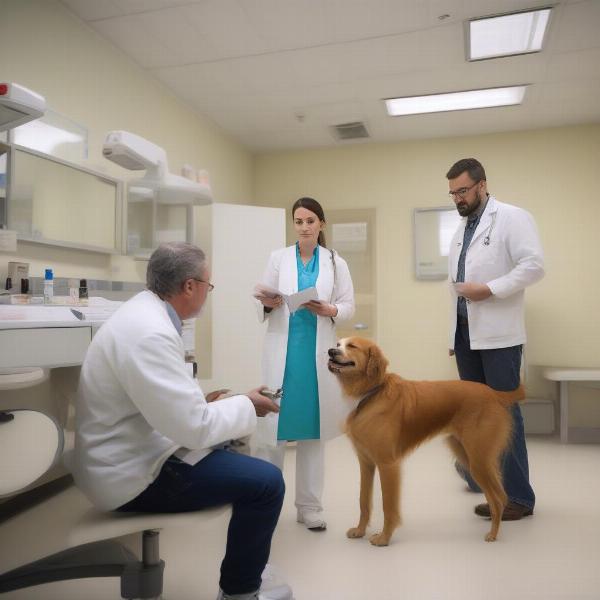Neutering dogs, a common procedure involving the surgical removal of reproductive organs, is a responsible choice for many pet owners. Neutering dogs trust involves understanding the benefits, the procedure itself, and choosing a veterinarian you can rely on. This comprehensive guide explores everything you need to know about neutering your dog, empowering you to make an informed decision for your furry friend.
Understanding the Benefits of Neutering Dogs
Neutering offers a range of health and behavioral benefits. For male dogs, it eliminates the risk of testicular cancer and significantly reduces the likelihood of prostate problems. It can also curb unwanted behaviors like roaming, marking territory, and aggression towards other males. For female dogs, neutering prevents unwanted pregnancies, eliminates the risk of uterine infections and tumors, and reduces the chance of developing mammary cancer. These health advantages contribute to a longer, healthier life for your companion.
Choosing a Veterinarian You Can Trust for Neutering
Selecting the right veterinarian for your dog’s neutering is crucial. Look for a licensed professional with experience in performing this procedure. Ask for recommendations from friends, family, or other pet owners. Research online reviews and testimonials. Don’t hesitate to schedule a consultation to discuss the procedure, ask questions, and gauge your comfort level with the veterinarian and their staff. poodle dogs for sale in houston
Key Questions to Ask Your Veterinarian
- What is the pre-operative procedure?
- What type of anesthesia will be used?
- What is the post-operative care routine?
- What are the potential risks and complications?
Having a clear understanding of these aspects will help you feel confident in your choice and ensure your dog receives the best possible care.
 Consulting with a Veterinarian about Neutering
Consulting with a Veterinarian about Neutering
Pre and Post-Operative Care for Neutering Dogs
Proper care before and after the neutering procedure is essential for a smooth recovery. Your veterinarian will provide specific instructions, but general guidelines include withholding food and water for a certain period before the surgery. After the procedure, your dog will need a quiet, comfortable space to rest and recover. Limit their activity to prevent complications and ensure the incision site heals properly. Monitor the incision for any signs of infection, such as redness, swelling, or discharge. Pain medication may be prescribed to manage discomfort.
Addressing Common Concerns about Neutering
Some pet owners express concerns about potential weight gain, personality changes, or other side effects after neutering. While weight gain can occur, it’s typically manageable with a balanced diet and regular exercise. Personality changes are usually positive, resulting in a calmer, less anxious dog. gastropexy procedure dog
Conclusion
Neutering your dog is a responsible decision that offers significant health and behavioral benefits. By choosing a trustworthy veterinarian, understanding the procedure, and providing proper pre and post-operative care, you can ensure a positive experience for both you and your furry companion. Neutering contributes to a healthier, happier life for your dog, strengthening the bond you share. douglas dogs uk
FAQ
- When is the best time to neuter my dog? Your veterinarian can advise on the ideal age for neutering, typically between six and nine months.
- How long does the neutering procedure take? The surgery itself usually takes 30-60 minutes, depending on the individual dog.
- Will my dog be in pain after the surgery? Pain medication is typically prescribed to manage post-operative discomfort.
- How long does it take for a dog to recover from neutering? Most dogs recover fully within two weeks. dogs knotted in women
- Will neutering change my dog’s personality? While some behavioral changes can occur, they are generally positive, such as reduced aggression and roaming.
- Will my dog gain weight after being neutered? Weight gain is possible, but it can be managed with proper diet and exercise.
- What are the signs of complications after neutering? Excessive bleeding, swelling, redness, discharge from the incision, lethargy, or loss of appetite should be reported to your veterinarian immediately.
ILM Dog is your trusted source for comprehensive information on dog care, offering expert advice on breeds, health, training, nutrition, grooming, and much more. We are passionate about helping you provide the best possible care for your canine companion. For personalized guidance and support, connect with our team of experts via email at [email protected] or call us at +44 20-3965-8624. ILM Dog is dedicated to helping you navigate every aspect of dog ownership, empowering you to build a strong, lasting bond with your furry friend.